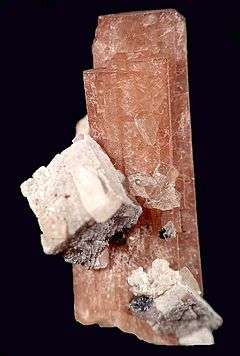Nenadkevichite
| Nenadkevichite | |
|---|---|
|
Nenadkevichite with ancylite crystals on the side | |
| General | |
| Category | Cyclosilicate |
| Formula (repeating unit) | (Na,Ca)(Nb,Ti)Si2O7·2H2O |
| Strunz classification | 9.CE.30a |
| Crystal system | Orthorhombic |
| Crystal class |
Dipyramidal (mmm) H-M symbol: (2/m 2/m 2/m) |
| Space group | Pbam |
| Identification | |
| Color | Rose-pink, very light pink, light yellow, brown; dark brown due to inclusions |
| Cleavage | Poor/ indistinct |
| Fracture | Irregular/ uneven |
| Tenacity | Brittle |
| Mohs scale hardness | 5 |
| Luster | Vitreous, dull |
| Streak | White, very light rose-pink |
| Diaphaneity | Transparent, translucent, opaque |
| Specific gravity | 2.78 - 2.885 g/cm3 |
Nenadkevichite is a rare silicate mineral containing niobium with formula: (Na,Ca)(Nb,Ti)Si2O7·2H2O. It forms brown to yellow to rose colored orthorhombic dipyramidal crystals with a dull to earthy luster. It has a Mohs hardness of 5 and a specific gravity of 2.86.
It was first reported in 1955 from a nepheline syenite pegmatite in the Kola Peninsula. In addition it has been reported from Mont Saint-Hilaire, Canada; the Ilimaussaq complex, Greenland; Windhoek District, Namibia; and Zheltye Vody, Ukraine. It was named after Konstantin Avtonomovich Nenadkevich (1880–1963), Russian mineralogist and geochemist.
References
This article is issued from Wikipedia - version of the 11/18/2016. The text is available under the Creative Commons Attribution/Share Alike but additional terms may apply for the media files.
